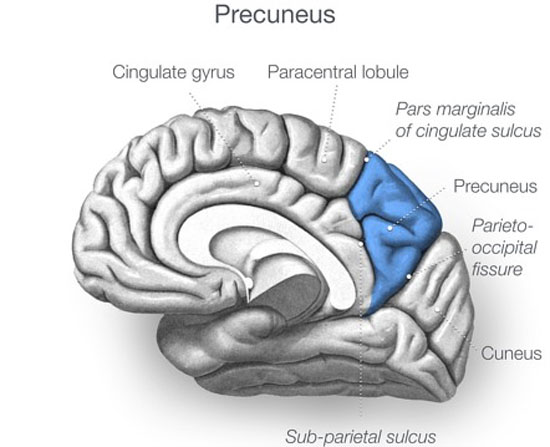Science Discovers Two Types Of Intuition, How Can You Learn To Master Each For A Fulfilled Life?
Intuition, gut-feelings, or what some call “psychic
downloads” are well acknowledged by science. Humans naturally experience what seems like
automatic and magical insights, things that often guide our decisions or our conclusions about
the world.

But unlike what many think, intuition isn’t some
unexplained magical power, it has roots in acknowledged science.
It can be argued that there are two different types of
intuition, body intelligence, and heart intelligence.
These are terms for discussion purposes, based on years of
research into psychology and extra-mind phenomenon, what is known as parapsychology in academic
circles.
Intuition of the body intelligence type are insights,
impulses, or downloads we receive based on past experience.
For example, if you burned your hand when you were a child,
as you reached for a hot pan on the stove, you’ll receive an instinct to be more cautious
when you’re near hot stovetops. This form of intuition is one that is fairly well
recognized by mainstream science, we might also refer to it as a reflex. This is something the
body learned how to do as a result of actual experience, a kind of animalistic wisdom stored
literally within your physical tissue or flesh. The benefit of this type is that you can retrain
your instincts in the present by being conscious and intentional with your actions.
Body intelligence is obviously very useful, however,
it’s hardly perfect. The systems that govern this type of intuition are ancient, lymphatic
and reptilian neurological structures we inherited from our animal ancestors. Animals are
creatures largely motivated by emotions, and as such, your body intuition also has the ability
to supply you with emotional insights as well. As a matter of fact, part of your emotions are
just reflecting back to you how you feel about something in your field, based on how
you’ve defined it in your personal life, what is called your personal knowledge
database.
PTSD, in this sense, is an extreme example of what ocurs when
this body intelligence intuition system breaks down, triggering fight or flight responses when
we don’t need to be on alert. This underscores that intuition is not perfect, it requires
careful discernment and thinking to really know if what is offered is true or valuable.
Intuition not only tells us what might be occurring or what
exists (truth insights) it also tells us what we should do (value insights).
Value intuition encourages us to do something which is more
of a kind of instinct or impulse. It’s still a kind of body intelligence, and as such,
this kind of intuition isn’t perfect because it draws from the past. Our values grow and
evolve with time, but our mind can’t get stuck in the past sometimes.
For example, when you feel a strong impulse to eat your
favorite sugary food, despite the fact you’re trying to lose weight, this is an example of
a past value asserting itself in the present, known as cross-purposing. It’s arguable that
without discernment, you might be led astray by this limited past-based intuition. Cognitive
dissonance of this type is best handled by using the power of the conscious mind to examine the
basis of each insight, working to attach yourself to the one that best aligns with your highest
values and ideals.
The second type of intuition is less understood. This is
called heart intelligence, a term coined by the Heartmath Institute.
The Institute conducted an experiment wherein they hooked up
measuring instruments to participants brains and hearts, measuring their responses to images
randomly selected on a viewing screen. Something completely unexpected occurred. The data showed
that the hearts of participants started to react to certain images five seconds before they were
randomly selected by a generator. This proves, with empirical scientific results, that the heart
has some kind of precognitive capacity – it can anticipate the future in some sense.
What’s interesting is that the reaction recorded was in
agreement with the value systems of the participants. That is, the future reaction was based on
how the patient presently saw the world, not how they would see it in the future. This
distinction is important because it suggests the emotions we experience are more a measure of
who we are now than who we could become in the future. Your emotions, unlike what some believe,
might not be a “higher level” source of information, what some call a soul insight,
or at least they aren’t infallible.
This latter point is controversial because it seems to go
against what some people believe in various new age circles, namely that one can be led totally
by their emotions and ignore reason and logic all together.

Despite the implications of this finding, the overall premise
that emotions and intuition can reveal much about ourselves still holds true.
All of this is helpful insofar a self-mastery because once we
realize our insights are a kind of holistic readout of who we are now, we can use them as a
guide to shape a more ideal life.
In this way, what is called the Ideal Self Method is
a quest to realize higher and higher states of fulfillment, joy, and bliss through seeking to
know yourself (now) while carefully making choices so as to guide your evolution in the
future.
The neurobiology of intuition and the science that studies it
say that it’s more important than ever now. In a world that’s often chaotic and
complex, knowing how to hear that inner voice can help you make better decisions.
The neurobiology of intuition exists and we’ve learned
something very interesting about it. Most people base a lot of the decisions they make on their
gut feelings. It’s basically just an inner voice in touch with your identity and
everything you’ve seen, felt, and experienced. Your intuitive side can actually be an
amazing tool if you make good use of it.
Let’s admit it. Intuition can often guide you to
invisible universes, it can connect you to a part of yourself that inhabits the most hidden
corners of your subconscious. It can feel so strange at times that you might think it
isn’t a very scientific experience. It must be mystical because there’s no obvious
logic to it. But that isn’t exactly true.
Intuition is really our sixth sense, and there’s a lot
of scientific literature about it. For example, there are fascinating books such as
Educating Intuition by Robin M. Hogarth and Blink: The Power of Thinking Without
Thinking by Malcolm Gladwell. In these books and many others on the topic, they argue for
the importance of intuition as a resource. They say that it can actually complement analytical
thought.
Then there are researchers such as Jonas Salk, who became
well known in his time for inventing a polio vaccine. This doctor wrote a thought-provoking
article in 1983, called The Merging of Intuition and Reason. In it, he talked about how
we should be using our sixth sense in our daily lives because it can help us make better
decisions.
“The intuitive mind is a sacred gift and the
rational mind is a faithful servant. We have created a society that honors the servant and has
forgotten the gift.” – Albert Einstein.
What Does The Neurobiology Of Intuition Have To Say?
First of all, the neurobiology of intuition suggests that
these mental processes aren’t all in our imagination. They actually have a neurological
foundation. Doctor Keiji Tanaka from the RIKEN Brain Institute led a fascinating study to try
and find some answers to what happens in our brains to create this sixth sense.
To figure that out, he used some experimental study subjects:
expert shogi players. The game is very similar to chess, and the most skilled players use their
intuition to make some amazing moves. Dr. Tanaka also performed a series of MRIs on this group
of people to see which parts of their brain they were using the most.
The Precuneus

According to his scans, the area of their brains that lit up
most was the precuneus. This is a little part of the superior parietal lobe, which also happens
to be right on the line between the right and left brain hemispheres.
The precuneus plays a role in episodic memory and visual-
spatial processing. But most interesting of all, it plays a role in consciousness.
The Ventromedial Prefrontal Cortex
Another interesting area that lit up when they were using the
intuitive parts of their brain was the ventromedial prefrontal cortex. This is a key part of our
brains. Why? It’s where we store all of the information on past rewards, along with the
pain of mistakes, or things we wish we hadn’t done so that we would have avoided
experiencing something bad.
Famous neuroscientist Antonio Damasio figured out how
important this part of our brain is in the decision-making process. The most interesting thing
about this brain structure is that it responds based on emotions.
Here’s an example. Imagine you meet someone at a party,
who then invites you to go back to their place. The ventromedial prefrontal cortex will do a
fast analysis based on your past experiences.
There could be something about their personality, appearance,
or speech that makes you skeptical of them. This is because they remind you of someone you had a
bad experience with. From there, it will send out an alarm to get your attention. That’s
your intuition trying to make its way into your conscious mind.
Once you’ve heard that inner voice, you have two
options. You can either listen to it or send it through the filter of analytical thought if you
want to examine it more carefully.
The Caudate Nucleus
Scientific studies on the neurobiology of intuition have also
emphasized the caudate nucleus. It’s a structure that’s part of the basal ganglia,
which plays a role in learning, habits, and automatic behaviors.
Basically, the caudate nucleus speeds up the sixth sense to
help you make quicker, almost automatic decisions based on your previous experiences or
learning.
“Don’t let the noise of other’s
opinions drown out your own inner voice. And most important, have the courage to follow your
heart and intuition. They somehow already know what you truly want to become. Everything else is
secondary.” – Steve Jobs.
As you can see from all this information, it’s hard to
chalk all these processes up to accidents or a product of our imagination. Not only is there a
neurological foundation to intuition but it also involves your past experiences, your
personality, and your subconscious, or the place that contains the essence of who you are.
Gut feelings aren’t just pseudoscience. They’re
actually a mechanism that has helped to define who we are as humans of all genders, races, and
cultures. This is really worth thinking about. You should always listen to that inner voice and
use your ability to think analytically about things when you need to.
yogaesoteric
January 23, 2020
